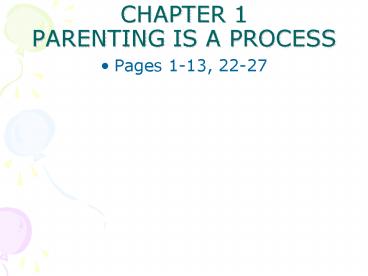CHAPTER 1 PARENTING IS A PROCESS - PowerPoint PPT Presentation
1 / 17
Title:
CHAPTER 1 PARENTING IS A PROCESS
Description:
Why do People Take on the Job? Preprogrammed to respond positively to babies ... Positive 'self-fulfilling prophecy' Parents as Advocates ... – PowerPoint PPT presentation
Number of Views:1355
Avg rating:3.0/5.0
Title: CHAPTER 1 PARENTING IS A PROCESS
1
CHAPTER 1PARENTING IS A PROCESS
- Pages 1-13, 22-27
2
Parenting is a Process
- What is a Parent?
- A parent is an individual who fosters all areas
of a childs growth - Nourishes
- Protects
- Guides
- Societys expectations of parents and of itself
- Box 1-1, p. 4
3
Parenting is a Process
- Why do People Take on the Job?
- Preprogrammed to respond positively to babies
- Society strongly encourages it
- Reasons reported by people
- Table 1-1, p. 6
- Study from the 1960s report that there are more
joys than problems - In the 1990s, informal poll reports that most
parents would not do it over
4
Parenting is a Process
- Reasons for not having children
- Restrictions
- Loss of freedom and time for other activities
- Negative feelings in relation to children
- Concerns about health of child
- Discipline difficulties
- Disappointment in child or self
- Concerns about child being poorly cared for
5
Parenting is a Process
- Parenting is a series of actions and interactions
on the part of the parent(s) to promote the
development of the child - Jay Belskys 3 influences
- 1. Childs characteristics
- 2. Parents personal history and psychological
resources - 3. Social context of stresses and supports
6
Role of the Child
- Childs needs
- Survival needs
- Person has an irrational attachment to child
over time - Regular interactions over long period of time
- Childs characteristics influence interaction
- Goodness of fit
- Match between childs qualities and parents and
societys expectations
7
Role of the Child
- Childrens importance to parents
- Love and emotional closeness
- Opportunity for personal growth
- Childrens importance to society
- Insure that society will continue
- Traditions will continue
- Economic growth will be sustained
- Support for elderly members of society
8
Role of Parents
- Nurture and protect children so that they grow
into competent adults - Box 1-1, p.4
- Parents bring to the situation
- Personal characteristics
- Human capital
- Skills, abilities, knowledge
- Financial capital
- Social capital
- Quality of relationship in and out of home
9
Role of Society
- Society provides a set of beliefs about
- Roles of the parent
- Roles of child
- Roles of the extended family members and the
community - Goals of parenting
- Approved methods of discipline
- Cultural groups have varying beliefs about the
above topics
10
Legal Definitions and Enforcement of Roles
- Defining roles defined in terms of
relationships - What constitutes the parent?
- Box 1-2, p.11
- Basic requirements of parenting and penalties for
failure - Immunization before age of 5
- Education between the ages of 5 and 18
- Raise law-abiding children
- Defines childrens role
- Expected to follow parents rules and requests
- More freedom for teens for some medical
procedures p.10 - Removed some protection Example p. 11
11
Cultural Expectations of Parents and Childrens
Roles
- Middle class roles are portrayed in print and
media - Do not reflect all views
- Currently society has demanding roles of both
parents - Childrens role is now
- Learner
- Consumers of material goods and entertainment
12
Providing a Protective Social Environment p.22
- Conclusions of Rochester Longitudinal Study
- Protective and Risk factors listed on p. 23
- 1.No one particular risk factor led to a poor
outcome - 2.Accumulation of risk factors led to poor
outcome - 3.Continuation across childhood
- 4.Power of disadvantaged environment
- 5.Combination of several factors have the
negative effect
13
Role of SocietyProtective factors
- In environment
- Fewer negative events
- Social support for families
14
Providing ExperiencesMaximal Growth and Potential
- Many studies indicate positive parenting helps
children reach maximum potential - Animal studies with reactive rats and monkeys
- Kagans research with reactive infants
- Skilled parenting and intellectual development
- Swedish study on social development criminality
15
Parents as Advocates
- Indirect influence by gathering resources and
helping children use them - Parents with children with delays and
disabilities - Changing societys view
- Promoting changes in education and accomadations
- Positive self-fulfilling prophecy
16
Parents as Advocates
- Extra effort and commitment to help children to
outstanding achievement - Individual commitment
- Family support
- Outstanding instruction
17
Indispensable Caring Figures
- There really is no substitute for a caring adult
figure in a childs life, be it a parent, a
relative, or a friend. p. 26 - Example from New Jersey, p. 26
- With social support, stress levels can be
manageable

